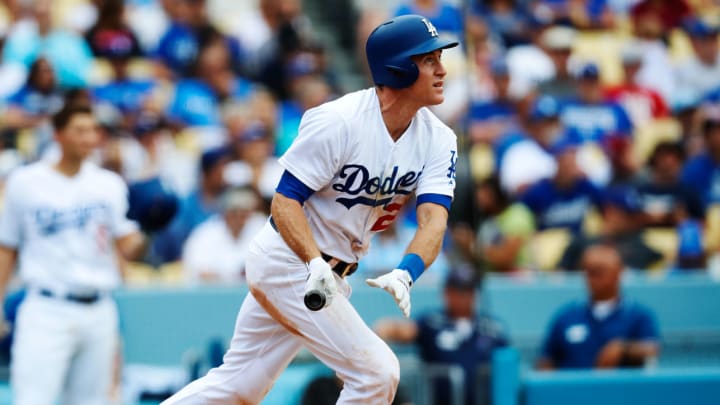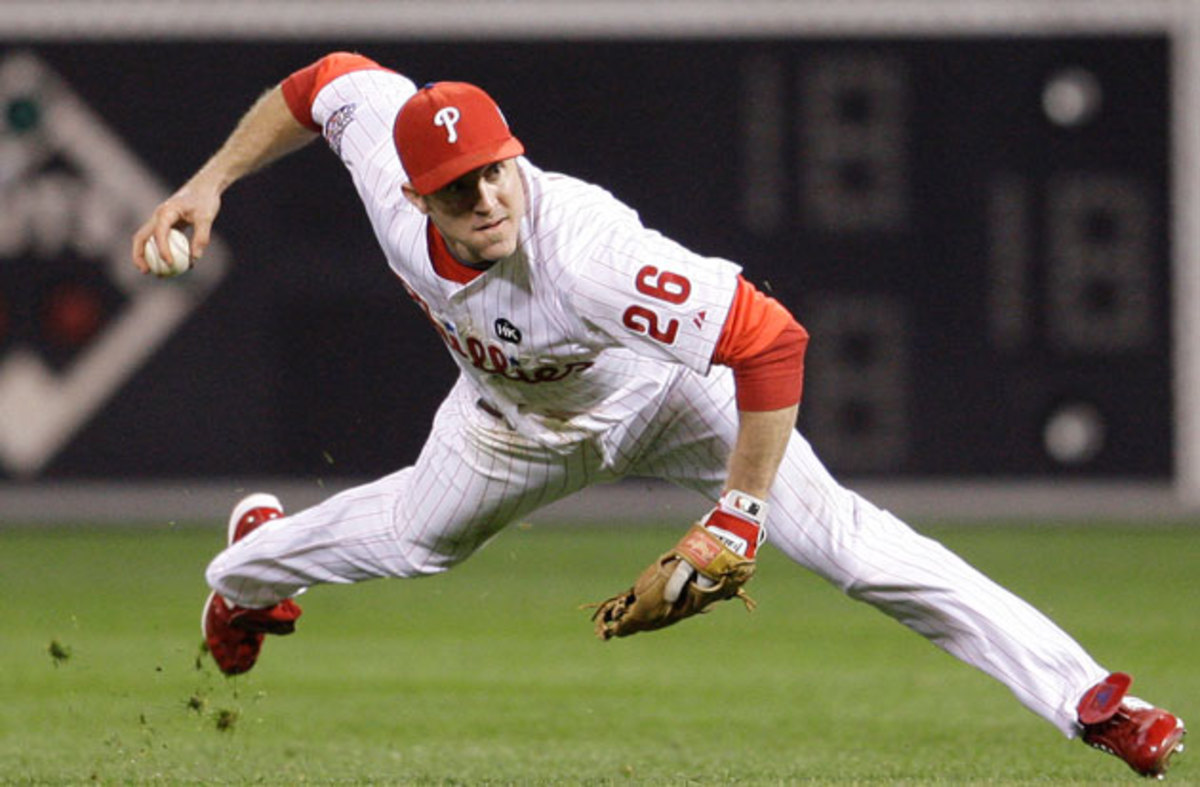Chase Utley's 1,000 career RBIs further substantiate his polished, underrated career

Late Friday night at Dodger Stadium, Chase Utley did something he’s probably done a million times—set up in the batter’s box to take his trademark swing. That familiar compact punch through the strike zone resulted in something he’s now done 1,000 times—drive in an MLB run.
In April 2003, a young Utley recorded his first major league hit: a grand slam that scored Jim Thome, Mike Lieberthal and David Bell at the long-ago demolished Veterans Stadium. Friday’s double drove home Joc Pederson, who was not even born yet when Thome first reached the big leagues.
As Utley’s third season as a Dodger hits the All-Star Break, the second baseman’s career milestone is a handy reminder of what a star he has been. Add up all of Utley’s numbers once he retires, and his career will likely be better than the raw totals indicate. Due to a relatively late start and a string of injuries that sapped him of playing time during the second half of his prime, Utley’s Cooperstown case won’t be bolstered by gaudy counting stats.
But at his peak, Utley was one of the best players in baseball for an extended time. From 2005–2010, Utley’s 45.3 WAR ranked second in MLB, behind only Albert Pujols, finishing closer to Pujols in first place than Alex Rodriguez in third. He led the league in runs once and times hit by pitch three times, but never earned any other “black ink” in his career. He watched two teammates (Ryan Howard and Jimmy Rollins) earn MVPs, though he (somehow) never finished in the Top 5.
Play ball (again)! Home run chases, pennant races, trading aces, new World Series faces
Still, you could easily make the case that he was the best player on a team that won five straight divisions, back-to-back pennants and a World Series. His “deke play” in the seventh inning of the clinching game of the 2008 World Series has gone down as a signature play in his own career, and the team’s title run. The following fall, Utley tied Reggie Jackson’s record with five home runs in a single World Series, though the Phillies fell to the Yankees in six games.
His most notable statistical achievements that don’t require heavy math would be his ninth place standing on the all-time hit by pitch list (as he was never above trading a bruise for first base) and a stolen base percentage of 87.6% that ranks second in MLB history.

The metric that best shows his all-around greatness is to look at how Baseball Reference measures runs created at the plate and on the bases, and saved defensively. The only two players in baseball history to rate better than Utley in all three areas of batting, defense and base-running are Barry Bonds and Willie Mays.
And when we eventually look back on a completed career that won’t be defined by the traditional counting stats, it’s significant that he is getting the chance to reach some round number milestones in his Dodgers twilight. Utley is now just the 14th second baseman to reach 1,000 runs scored and 1,000 RBIs, and he’s played fewer games than anyone else on the list. Of the other 13, 10 are Hall of Famers, two fell short and Robinson Cano is still active (* denotes a Hall of Fame inductee).
Player | Years | RBIs | Runs | Games |
|---|---|---|---|---|
Rogers Hornsby* | 1915–1937 | 1,584 | 1,579 | 2,259 |
Jeff Kent | 1992–2008 | 1,518 | 1,320 | 2,298 |
Charlie Gehringer* | 1924–1942 | 1,427 | 1,775 | 2,323 |
Eddie Collins* | 1906–1930 | 1,299 | 1,821 | 2,825 |
Bobby Doerr* | 1937–1951 | 1,247 | 1,094 | 1,865 |
Frankie Frisch* | 1919–1937 | 1,244 | 1,532 | 2,311 |
Craig Biggio* | 1988–2007 | 1,175 | 1,844 | 2,850 |
Robinson Cano | 2005–Present | 1,146 | 1,111 | 1,926 |
Nao Lajoie* | 1901–1916 | 1,141 | 1,083 | 1,988 |
Roberto Alomar* | 1988–2004 | 1,134 | 1,508 | 2,379 |
Joe Morgan | 1963–1984 | 1,133 | 1,650 | 2,649 |
Lou Whitaker | 1977–1995 | 1,084 | 1,386 | 2,390 |
Ryne Sandberg* | 1981–1997 | 1,061 | 1,318 | 2,164 |
Chase Utley | 2003–Present | 1,000 | 1,069 | 1,796 |
SI’s Jay Jaffe, our resident scholar on all matters involving Cooperstown, has pointed out that no player post-1960 has been inducted into the Hall of Fame with fewer than 2,000 hits. Utley has just 1,821, but has filled in some potential holes and erased a sizeable “yeah but…” from his final baseball card. Thanks to a late career push as a Dodger, it’s easier for mainstream fans and more old-school BBWAA voters to see him not just a guy who had a brilliant peak, but a guy who had a brilliant career.
For what it’s worth, Utley’s JAWS score—the metric Jaffe invented that compares a player’s peak stats and total stats to the Hall of Famers at his position—rates Utley 11th among second basemen. That’s ahead of nine Hall of Famers, including recent inductees Roberto Alomar and Craig Biggio.
It feels odd to say that Utley has helped his Hall of Fame case in L.A., considering he’s been a markedly worse player than he was in Philadelphia; his slash line has dipped low enough to take a noticeable dent out of his career totals. He hasn’t just been worse, he’s been a below average major leaguer, with an OPS+ of 90 across three seasons.
Team | AVG | OBP | SLG | OPS+ |
|---|---|---|---|---|
Philadelphia | .282 | .366 | .481 | 122 |
Los Angeles | .238 | .317 | .390 | 90 |
Total | .277 | .360 | .470 | 118 |
But in a way, taking the worst of his downfall in a new uniform has preserved Utley’s Philly numbers, to make it easier to look back and remember just how good he was. Much in the same way that Pujols’s pristine Cardinals averages are safe no matter what he does in Anaheim, and Ichiro’s .322 batting average with the Mariners is etched in stone even as his career rate stats slip.
MLB history is littered with aging ex-stars who hung around to reach certain achievements. Biggio posted -2.1 WAR in 2007 as he crossed the 3,000 hit threshold. Pete Rose had a negative WAR between 1985 and 1986, as he chased, set and extended his hit record.
Utley is not at that point, still on the positive ledger for the Dodgers. He’s appeared in 73 games, 52 as a starter, for a team that’s up 7.5 games in the NL West and barreling toward his eighth career trip to the postseason. He hasn’t been one of the Dodgers’ top performers at the plate, but he’s been productive enough to bat leadoff in 18 of his last 20 starts. He hasn’t had three months of consistency, but he did have a three-week hot streak from May 9–20, during which he batted .393/.470/.714 with nine extra base hits and 16 RBIs.
As Utley stood on second base Friday night, white hairs peeking out from the side of his helmet, it was a reminder that baseball marches on in its unending flat timeline. But the fans who adopted Utley as theirs, even though they missed out on that incredible prime, stood in appreciation. Mindful of the extra meaning we ascribe to round numbers, and the player Utley was as he collected all those ordinary integers along the way.
